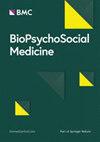泰国 COVID-19 大流行期间基层医疗单位患者的心理健康和复原商数:一项横断面研究
IF 2.4
4区 医学
Q2 PSYCHIATRY
引用次数: 0
摘要
2019 年冠状病毒疾病大流行对个人的身心健康都造成了影响。恢复力商数(RQ)是减少心理健康问题的一个重要因素。本研究旨在探讨初级护理病房(PCU)就诊患者的心理健康问题和抗逆商数。研究对象为2022年5月1日至2022年6月31日期间在宋卡纳加林医院PCU就诊的18至60岁患者。参与者填写了基线特征自填问卷以及初级保健评估、个人资源问卷、生活满意度量表、泰语RQ、PHQ-9和GAD-7,并通过描述性、逻辑回归和斯皮尔曼等级相关性对结果进行了分析。在 216 名参与者中,72.2% 为女性,年龄中位数为 39(24,51)岁。大多数人的 RQ 水平正常(61.1%)。其中,分别有 4.2% 和 12.1% 的人表现出中度到高度的抑郁和焦虑。该研究发现,性别(OOR 1.93; 95% CI 1.01-3.74)、年龄(OOR 1.03; 95% CI 1.01-1.06)、中度和高度社会支持水平(OOR 9.51; 95% CI 3.36-28.85)以及高生活满意度水平(OOR 4.67; 95%CI 1.75-13.25)与 RQ 相关。此外,研究结果表明,到 PCU 就诊≥ 3 次(β 1.73;95% CI 0.39-3.08)、体重指数(BMI)(β 0.13;95% CI 0.04-0.23)和经历压力事件(β 2.34;95% CI 1.32-3.36)与抑郁呈正相关。最后,经历压力事件(OR 4.1;95% CI 1.09-15.47)对焦虑有显著影响,然而,中度和高度的生活满意度是焦虑的保护因素(OR 0.19;95% CI 0.07-0.54,OR 0.03;95% CI 0.01-0.16)。虽然有少数患者存在中度至重度抑郁和焦虑,但他们中的大多数人的 RQ 水平正常。然而,也有一些患者的 RQ 水平较低,这与抑郁和焦虑等精神疾病的高风险相关。医疗服务提供者应重点采取干预措施,通过积极主动和防御性策略来增强复原力,从而在这一艰难时期减少负面的精神问题。本文章由计算机程序翻译,如有差异,请以英文原文为准。
Mental health and resilience quotient of patients in primary care units during the widespread COVID-19 pandemic in Thailand: a cross-sectional study
The coronavirus disease 2019 pandemic impacted both the physical and mental health of individuals. The resilience quotient (RQ) is an important factor that decreases mental health problems. This study aimed to explore mental health problems and RQ in patients who visit Primary Care Units (PCU). A cross-sectional study was conducted on participants aged 18 to 60 years who visited the PCU of Songklanagarind Hospital from May 1, 2022, to June 31, 2022. Participants completed a self-administered questionnaire on baseline characteristics and the Primary Care Assessment, Personal Resource Questionnaire, satisfaction with life scale, Thai RQ, PHQ-9, and GAD-7, and the results were analyzed by descriptive, logistic regression, and Spearman’s rank correlation. Among the 216 participants, 72.2% were female, and the median age was 39 (24,51) years old. Most of them had normal RQ levels (61.1%). Of these, 4.2% and 12.1% exhibited moderate to high levels of depression and anxiety, respectively. This study found that sex (OOR 1.93; 95% CI 1.01–3.74), age (OOR 1.03; 95% CI 1.01–1.06), moderate and high social support levels (OOR 9.51; 95% CI 3.36–28.85), and a high life satisfaction level (OOR 4.67; 95%CI 1.75–13.25) were associated with RQ. Moreover, the results showed that ≥ 3 times visiting PCU (β 1.73; 95% CI 0.39–3.08), BMI (β 0.13; 95% CI 0.04–0.23) and experiencing stressful events (β 2.34; 95% CI 1.32–3.36) were positively associated with depression. Finally, experiencing stressful events (OR 4.1; 95% CI 1.09–15.47) significantly affected anxiety, however, moderate and high life satisfaction levels acted as a protective factor against anxiety (OR 0.19; 95% CI 0.07–0.54 and OR 0.03; 95% CI 0.01–0.16, respectively). Although there were a few patients with moderate to severe levels of depression and anxiety, most of them had normal RQ levels. However, there were some patients with low RQ levels which correlated to a high risk of psychiatric diseases such as depression and anxiety. Healthcare providers should focus on interventions that enhance resilience in both proactive and defensive strategies to reduce negative mental problems during these formidable times.
求助全文
通过发布文献求助,成功后即可免费获取论文全文。
去求助
来源期刊

BioPsychoSocial Medicine
Multiple-
CiteScore
3.60
自引率
0.00%
发文量
23
审稿时长
18 weeks
期刊介绍:
BioPsychoSocial Medicine is an open access, peer-reviewed online journal that encompasses all aspects of the interrelationships between the biological, psychological, social, and behavioral factors of health and illness. BioPsychoSocial Medicine is the official journal of the Japanese Society of Psychosomatic Medicine, and publishes research on psychosomatic disorders and diseases that are characterized by objective organic changes and/or functional changes that could be induced, progressed, aggravated, or exacerbated by psychological, social, and/or behavioral factors and their associated psychosomatic treatments.
 求助内容:
求助内容: 应助结果提醒方式:
应助结果提醒方式:


